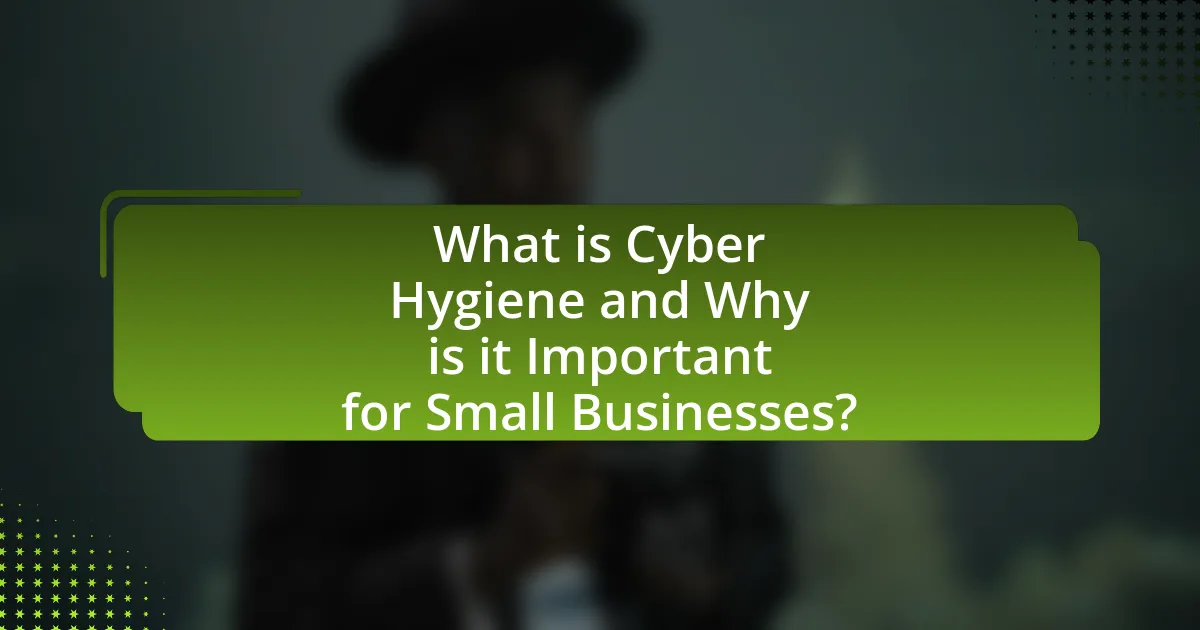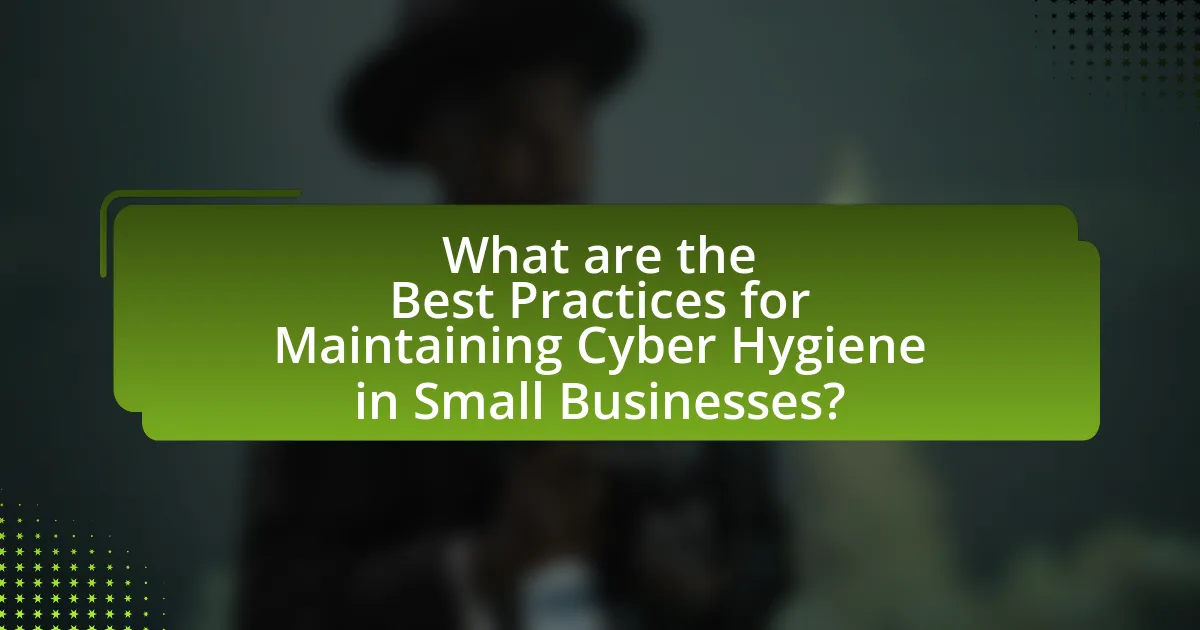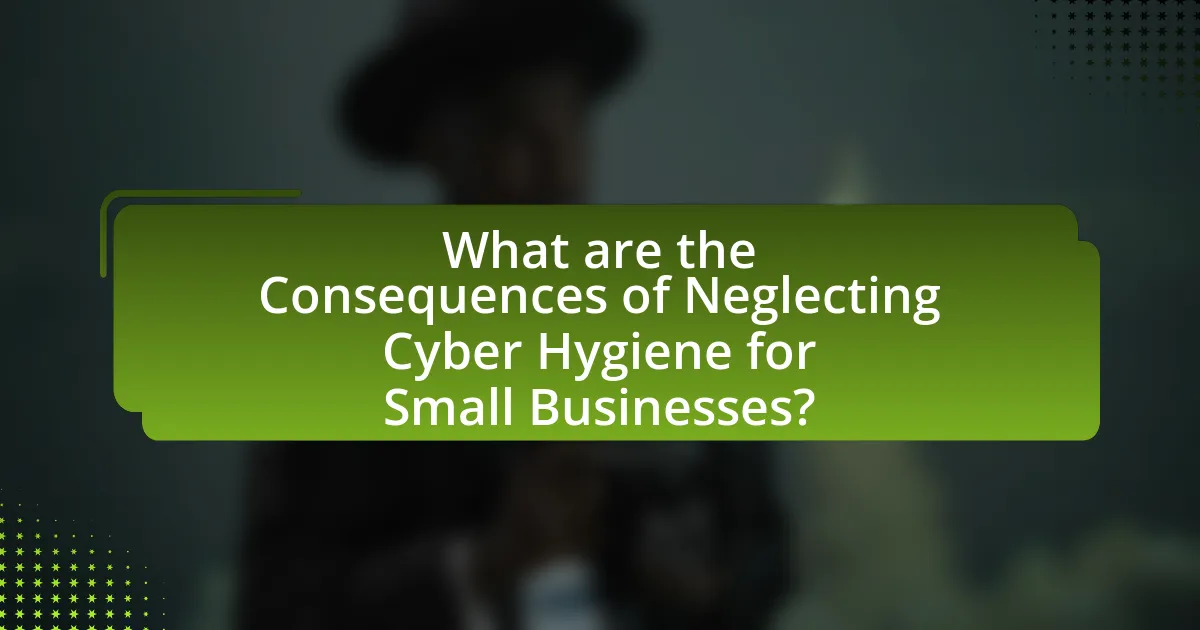Cyber hygiene is a critical practice for small businesses, encompassing the steps necessary to maintain the security and health of digital environments. This article highlights the importance of cyber hygiene in protecting sensitive data, reducing the risk of cyberattacks, and ensuring compliance with regulations. It discusses the impact of poor cyber hygiene on security breaches, common threats faced by small businesses, and the best practices for maintaining robust cybersecurity measures. Key principles such as regular software updates, strong password management, employee training, and network security are emphasized, along with the financial and reputational consequences of neglecting cyber hygiene. Additionally, the article outlines practical steps and resources available to help small businesses enhance their cybersecurity posture.

What is Cyber Hygiene and Why is it Important for Small Businesses?
Cyber hygiene refers to the practices and steps that individuals and organizations take to maintain the health and security of their digital environments. For small businesses, cyber hygiene is crucial because it helps protect sensitive data, reduces the risk of cyberattacks, and ensures compliance with regulations. According to a report by the National Cyber Security Alliance, 60% of small businesses that experience a cyberattack go out of business within six months. Implementing strong cyber hygiene practices, such as regular software updates, employee training, and data backups, can significantly mitigate these risks and enhance overall cybersecurity posture.
How does Cyber Hygiene impact the overall security of small businesses?
Cyber hygiene significantly enhances the overall security of small businesses by establishing best practices for managing and protecting digital assets. Implementing regular software updates, strong password policies, and employee training reduces vulnerabilities that cybercriminals exploit. For instance, according to the Cybersecurity & Infrastructure Security Agency (CISA), 85% of data breaches involve human error, highlighting the importance of training employees in cyber hygiene practices. By prioritizing cyber hygiene, small businesses can mitigate risks, safeguard sensitive information, and maintain customer trust, ultimately leading to a more secure operational environment.
What are the key principles of Cyber Hygiene?
The key principles of Cyber Hygiene include regular software updates, strong password management, data backup, employee training, and network security. Regular software updates ensure that systems are protected against known vulnerabilities, as outdated software can be an easy target for cyberattacks. Strong password management involves using complex passwords and changing them frequently to reduce the risk of unauthorized access. Data backup is crucial for recovering information in case of data loss or ransomware attacks, with the recommendation to follow the 3-2-1 backup rule: three copies of data, on two different media, with one copy offsite. Employee training raises awareness about phishing and other cyber threats, empowering staff to recognize and respond to potential risks. Finally, network security measures, such as firewalls and intrusion detection systems, help protect the network from unauthorized access and attacks. These principles collectively enhance the overall security posture of small businesses, making them less vulnerable to cyber threats.
How can poor Cyber Hygiene lead to security breaches?
Poor cyber hygiene can lead to security breaches by creating vulnerabilities that cybercriminals can exploit. For instance, weak passwords, outdated software, and lack of regular security updates increase the risk of unauthorized access to sensitive data. According to a 2021 report by Verizon, 81% of hacking-related breaches leveraged stolen or weak passwords, highlighting the critical role of strong password practices in maintaining security. Additionally, neglecting to implement security protocols, such as multi-factor authentication, can further expose systems to attacks. Therefore, maintaining good cyber hygiene is essential for protecting against potential security breaches.
What are the common threats small businesses face without proper Cyber Hygiene?
Small businesses without proper cyber hygiene face several common threats, including data breaches, ransomware attacks, phishing scams, and malware infections. Data breaches can lead to the unauthorized access of sensitive customer information, resulting in financial losses and reputational damage. Ransomware attacks can lock businesses out of their own systems, demanding payment for access restoration; in 2021, 37% of small businesses reported being victims of ransomware. Phishing scams trick employees into revealing confidential information, with a significant 90% of data breaches stemming from human error, often due to falling for such scams. Lastly, malware infections can disrupt operations and compromise data integrity, with small businesses being targeted due to their typically weaker security measures.
What types of cyber attacks are most prevalent among small businesses?
Phishing attacks are the most prevalent type of cyber attack among small businesses. According to the 2022 Cybersecurity Threat Trends report by the Cybersecurity & Infrastructure Security Agency (CISA), approximately 83% of small businesses reported experiencing phishing attempts. These attacks often involve fraudulent emails or messages that trick employees into revealing sensitive information or downloading malware. Additionally, ransomware attacks are also significant, with a report from the Verizon Data Breach Investigations Report indicating that 27% of small businesses faced ransomware incidents in the past year. This highlights the critical need for small businesses to implement robust cybersecurity measures to protect against these common threats.
How do these threats specifically target small businesses?
Cyber threats specifically target small businesses by exploiting their limited resources and lack of robust cybersecurity measures. Small businesses often have fewer IT staff and lower budgets for security, making them attractive targets for cybercriminals who can easily breach their defenses. According to the 2021 Verizon Data Breach Investigations Report, 43% of data breaches involve small businesses, highlighting their vulnerability. Additionally, small businesses frequently rely on outdated software and lack employee training on cybersecurity best practices, further increasing their risk of falling victim to phishing attacks and ransomware.

What are the Best Practices for Maintaining Cyber Hygiene in Small Businesses?
The best practices for maintaining cyber hygiene in small businesses include implementing strong password policies, regularly updating software, conducting employee training, and utilizing security tools. Strong password policies, such as requiring complex passwords and regular changes, help protect against unauthorized access. Regular software updates patch vulnerabilities, reducing the risk of exploitation; for instance, 60% of breaches involve unpatched software. Employee training on recognizing phishing attempts and safe internet practices enhances overall security awareness. Additionally, using security tools like firewalls and antivirus software provides an extra layer of protection against cyber threats. These practices collectively create a robust defense against cyber risks, essential for small businesses to safeguard their data and operations.
How can small businesses implement effective Cyber Hygiene practices?
Small businesses can implement effective Cyber Hygiene practices by establishing strong password policies, regularly updating software, and conducting employee training on cybersecurity awareness. Strong password policies, which include using complex passwords and enabling two-factor authentication, significantly reduce the risk of unauthorized access. Regular software updates patch vulnerabilities, as 60% of data breaches occur due to unpatched software, according to the Verizon Data Breach Investigations Report. Employee training enhances awareness of phishing attacks and safe browsing habits, which are crucial since 90% of successful cyberattacks start with a phishing email. By adopting these practices, small businesses can significantly improve their cybersecurity posture.
What role does employee training play in Cyber Hygiene?
Employee training plays a crucial role in Cyber Hygiene by equipping staff with the knowledge and skills necessary to recognize and mitigate cyber threats. Effective training programs enhance employees’ understanding of security protocols, phishing attacks, and safe online practices, thereby reducing the likelihood of human error, which is a significant factor in data breaches. According to a report by the Ponemon Institute, organizations that implement comprehensive security awareness training can reduce the risk of a data breach by up to 70%. This statistic underscores the importance of ongoing employee education in maintaining robust Cyber Hygiene within small businesses.
How can regular software updates enhance Cyber Hygiene?
Regular software updates enhance Cyber Hygiene by fixing vulnerabilities and improving security features. These updates address known security flaws that cybercriminals exploit, thereby reducing the risk of data breaches. For instance, a report from the Cybersecurity & Infrastructure Security Agency (CISA) indicates that 85% of successful cyberattacks exploit known vulnerabilities for which patches are available. By consistently applying updates, small businesses can significantly lower their exposure to cyber threats, ensuring that their systems remain secure and compliant with industry standards.
What tools and resources are available to assist small businesses in Cyber Hygiene?
Small businesses can utilize various tools and resources to enhance their Cyber Hygiene, including antivirus software, firewalls, and employee training programs. Antivirus software, such as Norton or McAfee, protects against malware and viruses, while firewalls, like those offered by Cisco or Fortinet, help block unauthorized access to networks. Additionally, resources like the Cybersecurity & Infrastructure Security Agency (CISA) provide guidelines and best practices for small businesses to follow, ensuring they maintain robust cybersecurity measures. Employee training programs, such as those from KnowBe4, educate staff on recognizing phishing attempts and safe online practices, which is crucial for maintaining overall cyber hygiene.
Which cybersecurity software solutions are recommended for small businesses?
Recommended cybersecurity software solutions for small businesses include Bitdefender, Norton, and Malwarebytes. Bitdefender offers comprehensive protection with advanced threat detection and a user-friendly interface, making it suitable for small businesses. Norton provides robust antivirus and firewall features, along with identity theft protection, which is crucial for safeguarding sensitive information. Malwarebytes specializes in malware removal and real-time protection against ransomware, ensuring that small businesses can effectively combat evolving cyber threats. These solutions are widely recognized for their effectiveness and reliability in protecting small business networks and data.
How can small businesses utilize free resources for Cyber Hygiene?
Small businesses can utilize free resources for Cyber Hygiene by accessing online training programs, cybersecurity toolkits, and government resources. For instance, the Cybersecurity & Infrastructure Security Agency (CISA) offers free resources, including the Cyber Essentials Toolkit, which provides guidelines for improving cybersecurity practices. Additionally, platforms like the Federal Trade Commission (FTC) provide free educational materials and webinars focused on protecting small businesses from cyber threats. Utilizing these resources helps small businesses implement effective cybersecurity measures without incurring costs, thereby enhancing their overall cyber hygiene.

What are the Consequences of Neglecting Cyber Hygiene for Small Businesses?
Neglecting cyber hygiene for small businesses can lead to severe consequences, including data breaches, financial losses, and reputational damage. Data breaches can expose sensitive customer information, resulting in an average cost of $3.86 million per incident, as reported by the Ponemon Institute in their 2020 Cost of a Data Breach Report. Financial losses can stem from direct theft, regulatory fines, and the costs associated with recovery efforts. Additionally, reputational damage can erode customer trust, leading to decreased sales and long-term business viability. In fact, 60% of small businesses that experience a cyber attack go out of business within six months, according to the National Cyber Security Alliance. Thus, the neglect of cyber hygiene poses significant risks that can jeopardize the survival of small businesses.
What financial impacts can arise from cyber incidents due to poor Cyber Hygiene?
Cyber incidents resulting from poor Cyber Hygiene can lead to significant financial impacts, including direct costs from data breaches, loss of revenue, and increased operational expenses. For instance, the average cost of a data breach in 2023 was estimated at $4.45 million, according to the IBM Cost of a Data Breach Report. Additionally, businesses may experience revenue loss due to downtime, which can average around $5,600 per minute, as reported by Gartner. Furthermore, companies often incur increased costs related to regulatory fines and legal fees, which can escalate quickly depending on the severity of the breach and the jurisdiction involved. These financial repercussions highlight the critical need for robust Cyber Hygiene practices to mitigate risks and protect financial stability.
How can a data breach affect customer trust and business reputation?
A data breach can significantly erode customer trust and damage business reputation. When sensitive customer information is compromised, customers often feel vulnerable and may question the security measures of the business. According to a 2020 study by IBM, the average cost of a data breach is $3.86 million, and 80% of consumers stated they would stop doing business with a company that experienced a data breach. This loss of trust can lead to decreased customer loyalty, reduced sales, and a tarnished brand image, making it difficult for businesses to recover. Furthermore, negative media coverage following a breach can amplify reputational damage, as seen in high-profile cases like Equifax, where the breach led to a significant decline in consumer confidence and trust.
What legal implications might small businesses face without proper Cyber Hygiene?
Small businesses without proper Cyber Hygiene may face significant legal implications, including liability for data breaches and non-compliance with regulations. Failure to implement adequate cybersecurity measures can lead to unauthorized access to sensitive customer information, resulting in potential lawsuits and financial penalties. For instance, the General Data Protection Regulation (GDPR) mandates strict data protection standards, and non-compliance can incur fines up to 4% of annual global turnover or €20 million, whichever is higher. Additionally, businesses may be held accountable under state laws, such as the California Consumer Privacy Act (CCPA), which imposes penalties for failing to protect consumer data. These legal consequences underscore the necessity for small businesses to prioritize Cyber Hygiene to mitigate risks and ensure compliance with applicable laws.
What regulations must small businesses comply with regarding data protection?
Small businesses must comply with regulations such as the General Data Protection Regulation (GDPR) in the European Union and the California Consumer Privacy Act (CCPA) in the United States. GDPR mandates that businesses protect personal data and privacy of EU citizens, imposing strict guidelines on data collection, processing, and storage. CCPA provides California residents with rights regarding their personal information, including the right to know what data is collected and the right to request deletion. Compliance with these regulations is essential to avoid significant fines and legal repercussions, as non-compliance can result in penalties up to 4% of annual global turnover under GDPR and up to $7,500 per violation under CCPA.
How can non-compliance lead to penalties for small businesses?
Non-compliance with regulations can lead to significant penalties for small businesses, including fines, legal action, and loss of licenses. For instance, failure to adhere to data protection laws, such as the General Data Protection Regulation (GDPR), can result in fines up to 4% of annual global turnover or €20 million, whichever is higher. Additionally, non-compliance can damage a business’s reputation, leading to decreased customer trust and potential loss of revenue. The enforcement of these regulations is often strict, with regulatory bodies actively monitoring compliance, making it crucial for small businesses to prioritize adherence to avoid these severe consequences.
What practical steps can small businesses take to improve their Cyber Hygiene?
Small businesses can improve their Cyber Hygiene by implementing strong password policies, regularly updating software, and conducting employee training on cybersecurity awareness. Strong password policies, such as requiring complex passwords and regular changes, reduce the risk of unauthorized access. Regular software updates patch vulnerabilities, as 60% of breaches occur due to unpatched software, according to the Verizon Data Breach Investigations Report. Employee training enhances awareness of phishing attacks and safe browsing practices, which are critical since 90% of data breaches involve human error.



